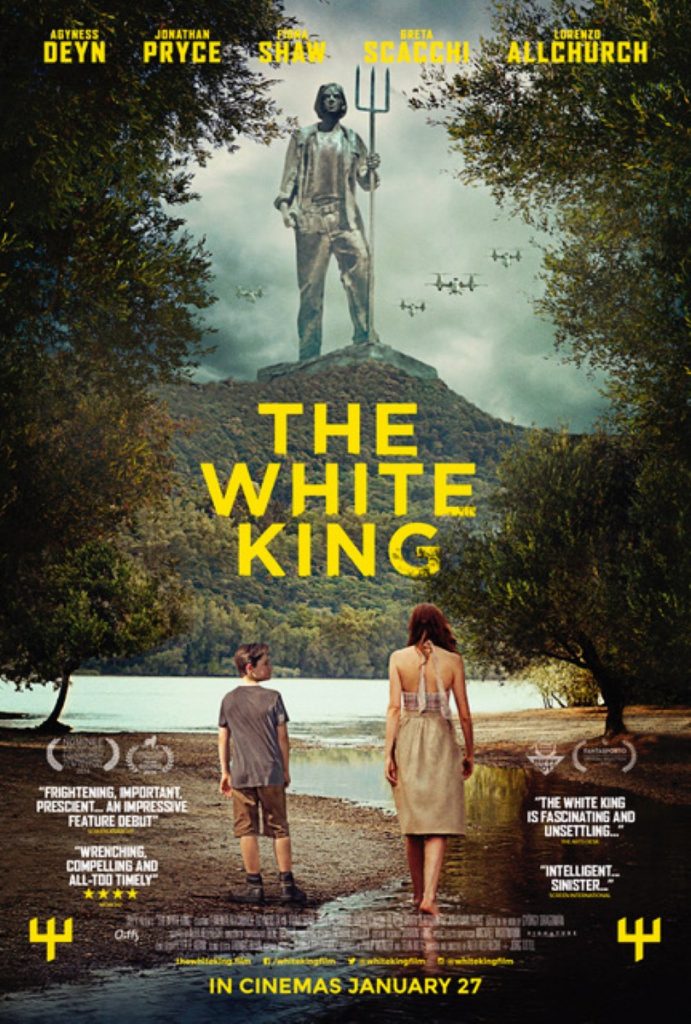By Jörg Tittel
History has a funny way of catching up with us.
A few years ago, my wife and creative partner Alex Helfrecht fell in love with an intense novel rooted in the dark days of life behind the Iron Curtain. The White King, György Dragomán's multiple award winning novel, tells a series of stories about Djata, a boy whose father is abruptly taken away by the authorities. By page three, Alex was in tears. And she felt we should adapt it into our first feature film. You don’t really say no to Alex.
Rather than making a drama set in Ceausescu's Romania for instance (country and time are never specified in the book), we decided we would set our film in a fictitious near-future dictatorship. We felt that historical dramas, no matter how harsh the history they depict, can often have a comforting effect on the audience. Nazis, just look at how terrifying they were and yet they were led by that hateful buffoon. Look at those ridiculous KKK members parading the streets in their silly hats. A giant border wall separating East from West? How ridiculous. How awful. How stupid they were. Good thing it's all in the past.


Dragomán gave us his blessing. He granted us the rights, but only because we were going to make his story our own. And so we made this curious film, a historical drama set in the future. Or so we thought.
In the summer of 2015, Alex and I moved to Hungary for four months – two months to prepare, 30 days to shoot. We took our two small kids with us, two nannies (just in case), and lots of blind faith.

Two weeks in, Orban announced he was building a border wall to keep Syrians and other refugees out. We immediately felt landlocked, like the characters in our film’s walled off 'Homeland'. Hungary's beautiful landscapes, our great crew and fine local wines gave us small comfort. But one could feel change in the air.
As a sick reminder, we lived on Andrássy Avenue, mere blocks away from the House of Terror. Despite its name, it's not a Hollywood theme park ride, but a memorial dedicated to the victims of Hungary's fascist and communist regimes of the 20th century. It's extraordinary to see how terror merely changed logos after the war – from the Arrow Cross to the Communist ÁVH. Monstrous torture and systematic cruelty would continue under another brand name. The past not forgotten but smoothly replaced.
The White King premiered at Edinburgh International Film Festival last year, and was nominated for the Michael Powell Award for Best British Feature. We were very flattered to be called a British film, seeing as we had received no support from British institutions. We'd made a quintessentially European British film: based on a Hungarian novel, shot in Hungary with a pan-European cast and crew, with editing, VFX and sound done between Berlin, Stockholm, Warsaw and London.
We premiered three days before the EU referendum. Even before Brexit, our film wasn't really British. The White King was always a European art house drama disguised in commercial dress.
After Brexit however, our film morphed into a freaky foreign hybrid, a mutant from an era when Britain and Europe were endlessly intertwined and intermarried. Some critics and audience members loved it, many respected it, but some really didn't get it at all. It wasn't relevant to them, it was about a world they didn't recognise or understand. They didn't want to accept that perhaps our film may be about our Western civilisation here and now.
We had our international premiere months later at Black Nights Film Festival in Estonia's capital, a country that has always been under Russian threat. Great Britain had just announced they would be sending hundreds of troops there. It felt like the Cold War all over again.
Our film was finally released to UK's general public in January, exactly one week after Donald Trump's inauguration. Suddenly, critics call our film "important", "eerily topical", "disturbing" "insightful". People tell us we should be proud to have made such a relevant film.

We always knew we were depicting a possible reality, but we never thought our own reality would darken so quickly. It's not something to be proud of. It's horrifying.
We all had our blinders on. We all believed that some Anonymous hacker hero would simply delete the fascists while donning a 'V for Vendetta' mask, we all wanted to believe that any future tyrants would get their asses kicked by Jennifer Lawrence. The action figure looked so strong, so determined.
The White King was never intended as a documentary. It's not a piece of passive escapism. It's a story that warns us that we can't escape but that we better get ready to fight. You and me. Here. In real life. History has a funny way of catching up with us.
The White King, directed by Alex Helfrecht + Jörg Tittel, starring Jonathan Pryce, Agyness Deyn, Fiona Shaw and Greta Scacchi, is now available on iTunes and Amazon Video UK. For more information, visit www.thewhiteking.film. Follow Jörg on twitter.com/newjorg
The opinions in politics.co.uk's Comment and Analysis section are those of the author and are no reflection of the views of the website or its owners.












